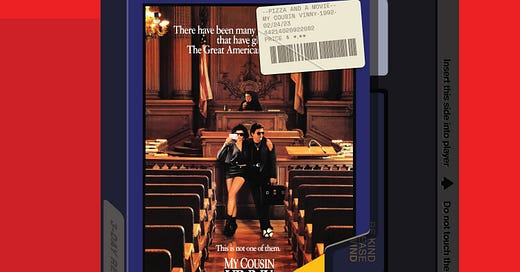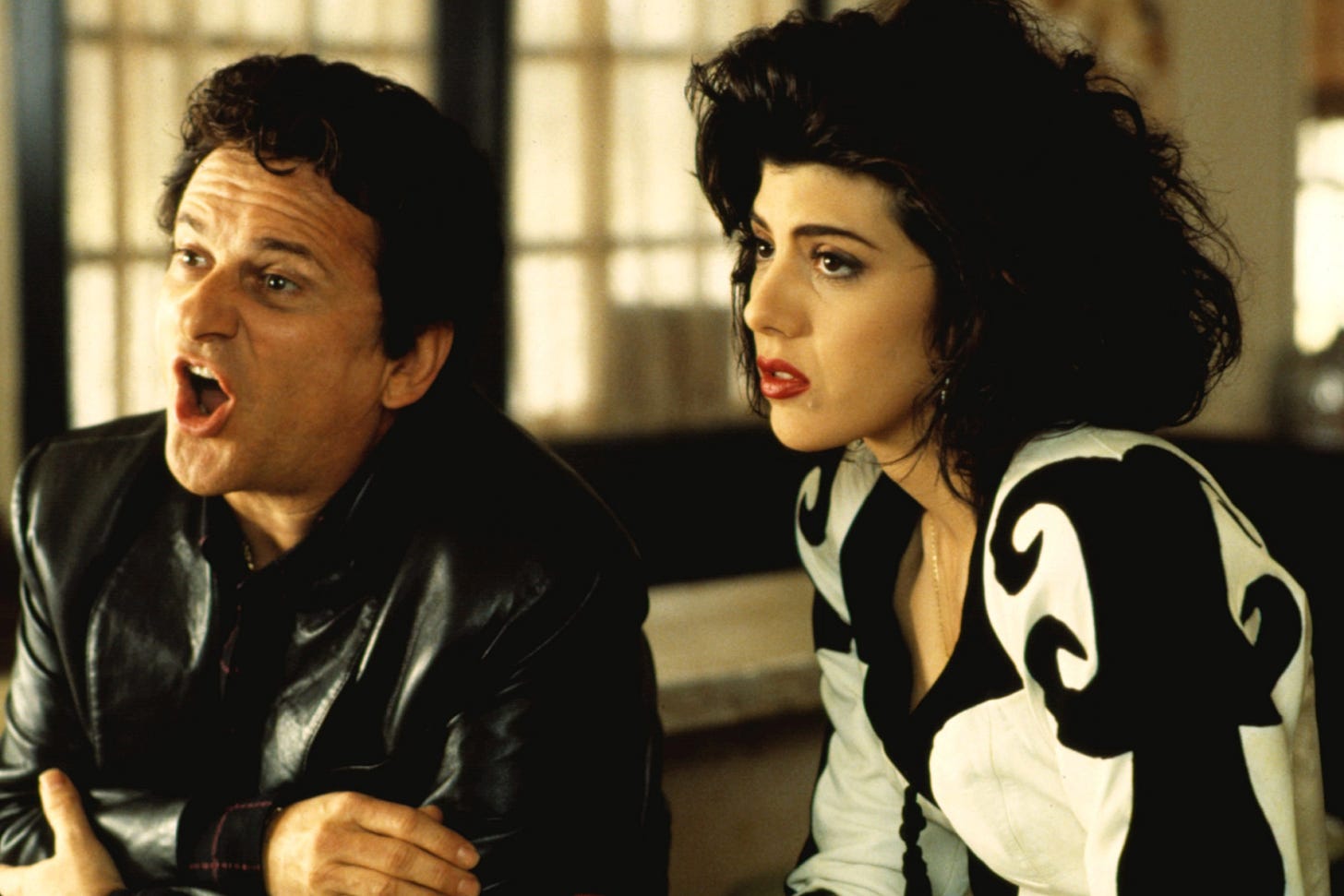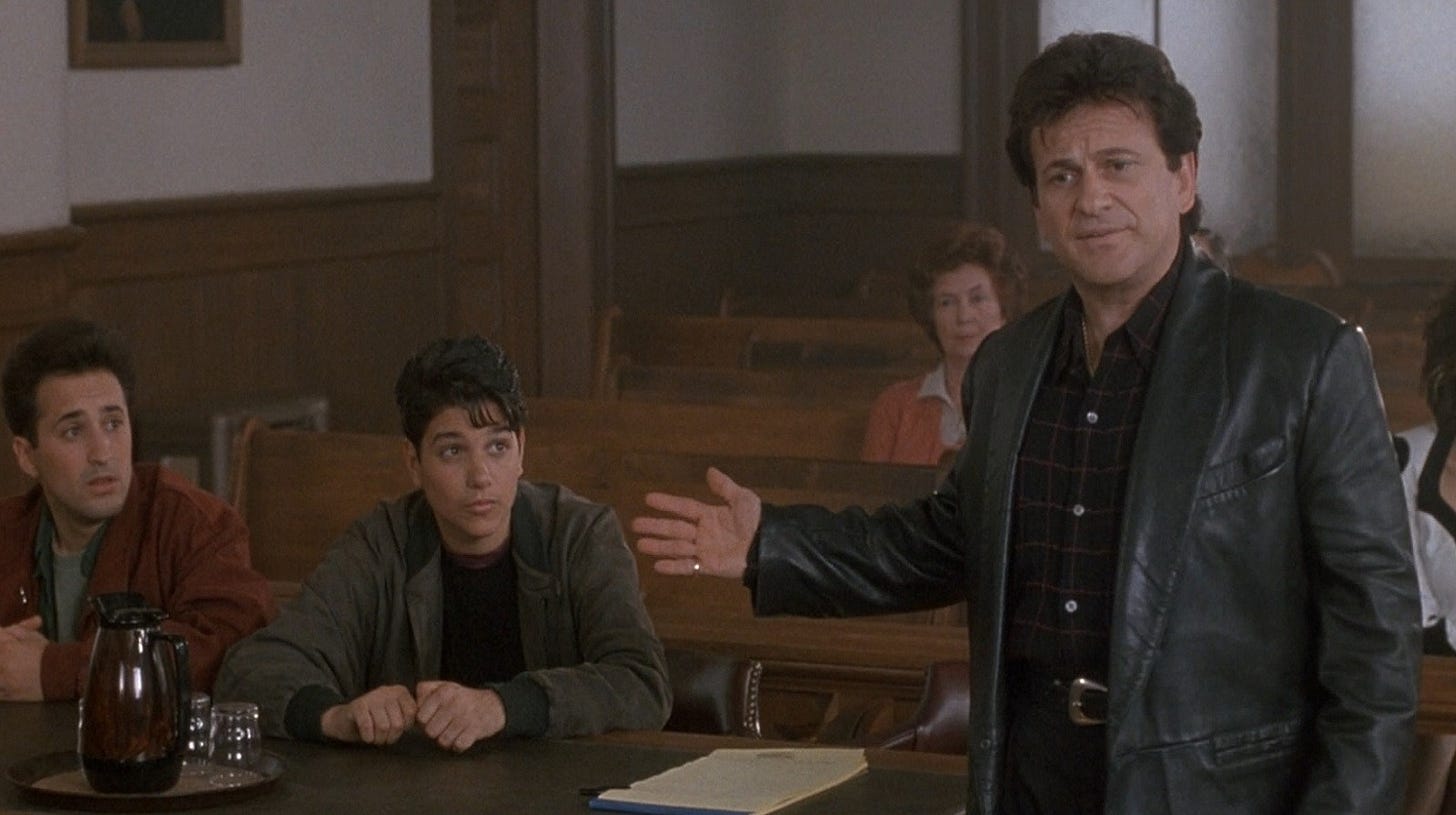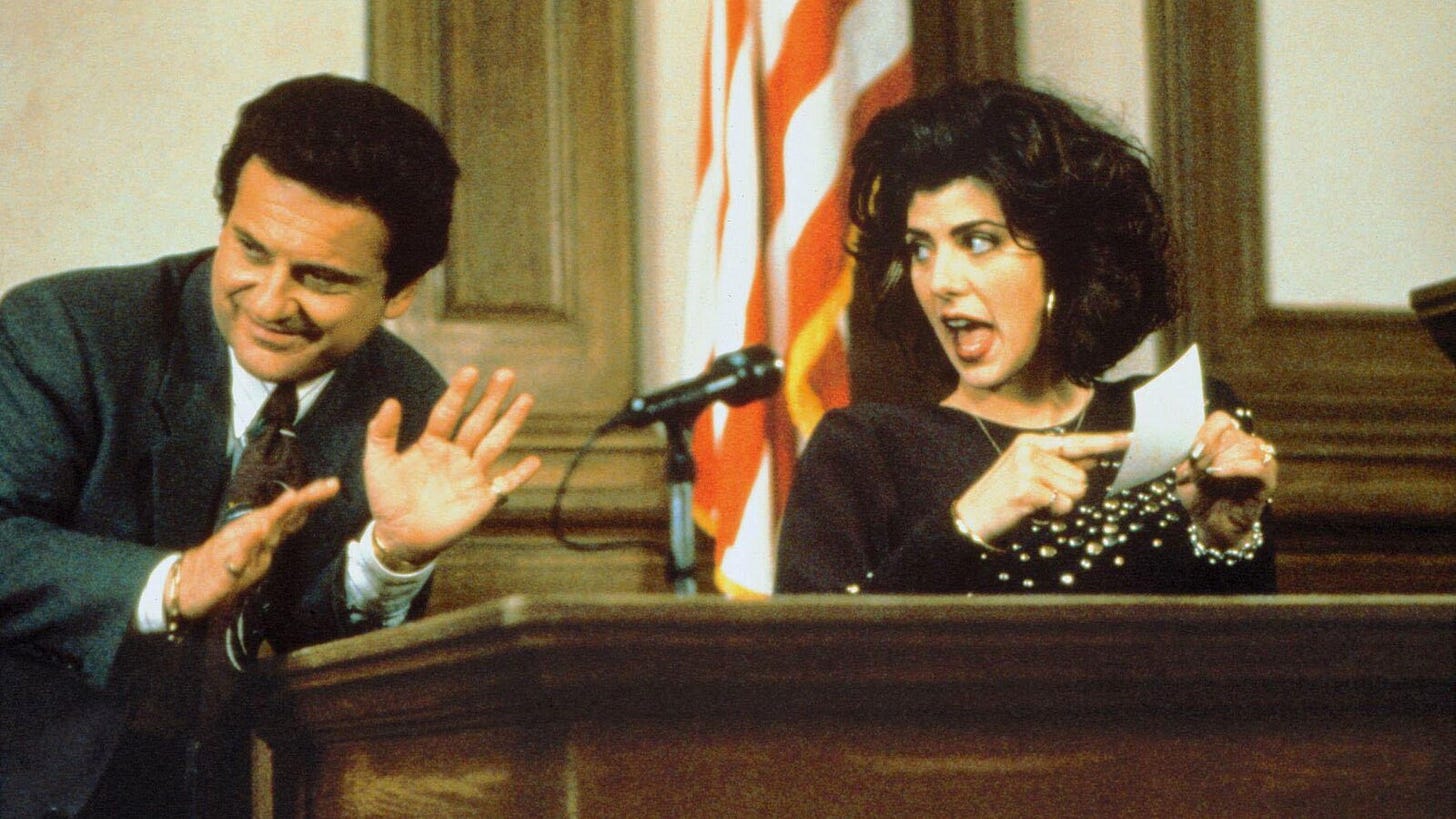My Cousin Vinny
1992 • R • 2hs • Watch trailer • Rent it • Stream on HBO Max
✌️🎟️ Legal Eagles Double Feature: Pairing two legal dramas, vintage ’92 and ’93.
Spring is coming. For the first time in a while, maybe you want to get out of the same ol’ pond and try fresh water. But you should have stuck to the rivers and streams that you’re used to. ’Cause dis fish? Dis fish? It’s outta wat-uh hun, but don’ wuh-ry abouddit uh-kay? Tonight we see what happens when New York drives down Alabama way. It’s Legal Eagles part one: My Cousin Vinny.
Here’s the plot. NYU college kids Bill (Ralph Macchio) and Stan (Mitchell Whitfield) buy snacks at the wrong convenience store while driving through Alabama. Cops pick them up for a misunderstanding—and a murder. They didn’t do it but things look pretty bad. Next stop, the ‘Bama Slamma. Bill uses his one phone call to hire his cousin, Vinny (Joe Pesci), who just passed the bar. On the sixth try. He’s an ambulance-chaser; this is is his first trial. It looks like drowning Bill and Stan have just been thrown the worst possible life preserver. Vinny and Mona Lisa (Marisa Tomei), his longtime fiancée, arrive, looking as fit for their surroundings as a yellow cab in a cotton field. Vinny meets the presiding Judge Haller (Fred Gwynne), who instantly takes whatever the opposite of a liking is to him. The prosecutor, Jim Trotter (Lane Smith), isn’t any friendlier, clocking Vinny as a green low-achiever. They’re both right, but they’re forgetting Vinny’s from the city where dreams are made of “there’s nothing you can’t do”. Can Vinny pull himself up by his own black leather cowboy boots in time to save Bill and Stan? Can he and Mona Lisa stop bickering long enough to crack what really happened? And what is a grit, anyway?
How’d we get My Cousin Vinny? Great question! Really to the point. You must be a subscriber! To answer your question, making an authentic gumbo requires what they call the holy trinity—onions, bell peppers, and celery. Same with this script.
First, diced onions: Vinny is based on a real guy. Screenwriter Dale Launer knew of a lawyer who passed the bar on his thirteenth try. Now we add bell peppers: The road trip was real. Launer even got his own car stuck in mud like Vinny. He left the experience thinking it’d be a chuckle to have somebody run into a spot of legal bother in the South and get stuck with the kind of lawyer that makes you do air quotes when you say “lawyer”.
Our ingredients are combining nicely. But we need celery, which is where our prosecutor comes in. Jim Trotter was real. Launer met a DA who became the basis of that character. Trotter, being such a masterclass in southern cruelty by way of hospitality, could only be drawn from life. There’s that bitter herbal subtlety. And that’s how you make a Vinny gumbo.
When casting for My Cousin Vinny, they saw other people, but landed Pesci for the lead. He’d been in Lethal Weapon 2 (’89) and was wrapping up Goodfellas (’90). Home Alone (’90) was in the mix too. Tomei was on set for a different movie when director Jonathan Lynn popped in to see his pal John Landis. Johns gotta stick together, I guess. He hadn’t found his Mona Lisa but knew Tomei was the one. He had to work to sell relatively unknown Tomei to Fox, but they eventually caved. Though Pesci has a well-defined tough guy body of work, Tomei’s career is much more interesting to me. She’s won an Oscar for this, hosted SNL, worked with everyone from Adam Sandler to George Clooney, voiced a Wild Thornberry, played Aunt May, and everything in between. She’s always credible, always seems like a real person. It took that to bring Pesci’s larger-than-life Vinny down to human scale.
Vinny cost $11M, which would have been a medium-sized budget at the time. It made that back easy, taking in $53M in the States and another $11M internationally. I chalk the appeal up to such a very, very American story. Even in international waters, folks know when a fish is out of the wet.
Vinny didn’t make the big bucks because critics liked it. Critical response was room temperature. Roger Ebert gave it 2.5 stars out of 4, a common reaction. But here’s my take. 2.5 out of 4 movies are often solid gold. No, slightly-better-than-average doesn’t usually win Oscars. But having a normal story with one or two stand-out elements is sheer perfection, as Mary Berry would say. Why did we like Pulp Fiction? It’s just edited out of order. Pirates of the Caribbean? That dank Depp. WALL-E? The sweet robot doesn’t talk. Many highly enjoyable things are just “good”, but therein lies their greatness. Vinny’s storytelling is classic though unoriginal, but Pesci and Tomei’s crackle make me smile the whole way through.
Audiences sure liked it—most of all Pesci and Tomei. They quoted their lines. Talked the grits talk. Commiserated about never getting married. The trick Vinny pulls off is offering audiences two different salts-of-the-earth. If you swing southern, you’ll enjoy folks who insist on things being done a certain way. If you like the city, you’ll say “Yes, finally!” when people just say what they mean, even if it’s not polite. Movie-goers in ’92 rented Vinny over and over when it hit VHS, then watched it on cable a couple years later. This is the definition of a rental classic. It’s comfortable, but a little better than it strictly has to be.
Know who else liked Vinny? Lawyers. Law school is funny. Yes, it teaches you law. But no, it doesn’t teach you how to present it. Lawyers learn how to make cases, handle witnesses and appeal to juries in courtrooms. We watch Vinny learning on the job. Maxwell Kennelly said, “Part of why the film has such staying power among lawyers is because, unlike, say, A Few Good Men, everything that happens in the movie could happen — and often does happen — at trial.”
In ’13, law professor Alberto Bernabe said, “Vinny is terrible at the things we do teach in law school, but very good at the things we don’t.” Merrick Garland quoted the movie in ’19 as an authority on cross-examination. Shoot, legal textbook A Guide to Forensic Testimony took courtroom sections apart at length as an “extremely helpful introduction to the art of presenting expert witnesses”. Wonder if Gilligan and Gould had Vinny in mind when they created Better Call Saul. Feels like Jimmy has a little Vinny to him.
I grew up in Alabama. A lot of Vinny is real to me. Feels just like what I grew up around. Mean people and nice people, like everywhere. I’ve eaten in a diner like the grits one. So for me, it was fun to put the top down and take this detour through ‘Bama with you!
Next week we’re moving forward a year to ’93 for The Pelican Brief. This time, the law is serious! It’s mid-career Denzel Washington and Pretty Woman-era Julia Roberts armed with a Grisham novel’s worth of twists and turns. It’ll hit your inbox next Friday.
If you liked this one, share it! It really does help.
NOTES:
Scenes in the Alabama prison were shot in a real working prison. The incarcerated extras? Actual inmates.
If you grew up on black-and-white sitcom reruns like I did, you’d know Fred Gwynne as Herman Munster from The Munsters. If you watched Lois & Clark, you’d know Lane Smith as Clark Kent’s boss, Perry White. Of course you know Ralph Macchio as the titular Karate Kid.
Almost-Vinnies: Andrew Dice Clay, Danny DeVito, Peter Falk, Robert De Niro, Jim Delushi.
Ben Stiller and Will Smith were almost Bill and Stan.
Director Jonathan Lynn holds a law degree from Cambridge.
Austin Pendleton, who played the stuttering public defender, had overcome a stutter in real life and very much didn’t like revisiting that for this role. He regretted taking it.
They reused the courtroom set from TV shot In the Heat of the Night.
Judge: “Do you two know each other?” Vinny: “Yeah, she’s my fiancée.” Judge: “Well, that would certainly explain the hostility.”











I remember seeing this movie at the theater. I had low expectations but was pleasantly surprised at how good of a comedy it was.